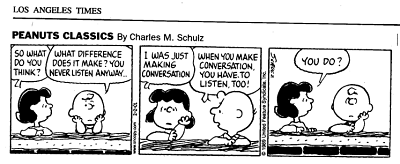Cultivating Relationship Through Conversation | Listen Quietly and Intentionally
April 5, 2014 Life Together
"To answer before listening— that is folly and shame." (Proverbs 18:13)
"My dear brothers and sisters, take note of this: Everyone should be quick to listen, slow to speak and slow to become angry." (James 1:19)
"The first service that one owes to others in the fellowship consists in listening to them. Just as love to God begins with listening to His Word, so the beginning of love for the brethren is learning to listen to them" —Dietrich Bonhoeffer, Life Together
Knowing we should listen and truly hear others does not make the concept simple to engage. In this me centered world we inhabit it seems antithetical to remain silent while someone pours forth their story, their needs, their fears. We may presume to know where the conversation is headed and instead of actively listening we connect halfheartedly telegraphing impatient distraction. Often a self centered one-up manship occurs wherein we desire to demonstrate vocally how we completely understand and we rush into their inhalation with what we feel is more impressive and important; shifting the focus, discounting the words, and projecting an attitude of indifference.
When others approach us with a need to converse we are in a unique position to bolster, encourage, and acknowledge by listening intently; truly hearing with our whole self ; loving others as we are loved.
The following article offers six important steps to tune our active listening:
Six Lessons in Good Listening By David Mathis
Listening is one of the easiest things you’ll ever do, and one of the hardest.
In a sense, listening is easy — or hearing is easy. It doesn’t demand the initiative and energy required in speaking. That’s why “faith comes from hearing, and hearing through the word of Christ” (Romans 10:17). The point is that hearing is easy, and faith is not an expression of our activity, but our receiving the activity of another. It is “hearing with faith” (Galatians 3:2, 5) that accents the achievements of Christ and thus is the channel of grace that starts and sustains the Christian life.
But despite this ease — or perhaps precisely because of it — we often fight against it. In our sin, we’d rather trust in ourselves than another, amass our own righteousness than receive another’s, speak our thoughts rather than listen to someone else. True, sustained, active listening is a great act of faith, and a great means of grace, both for ourselves and for others in the fellowship.
The remainder of this valuable article can be viewed here: Six Lessons in Good Listening.
Additionally, click here for more tools for listening: How to Become a Good Listener.